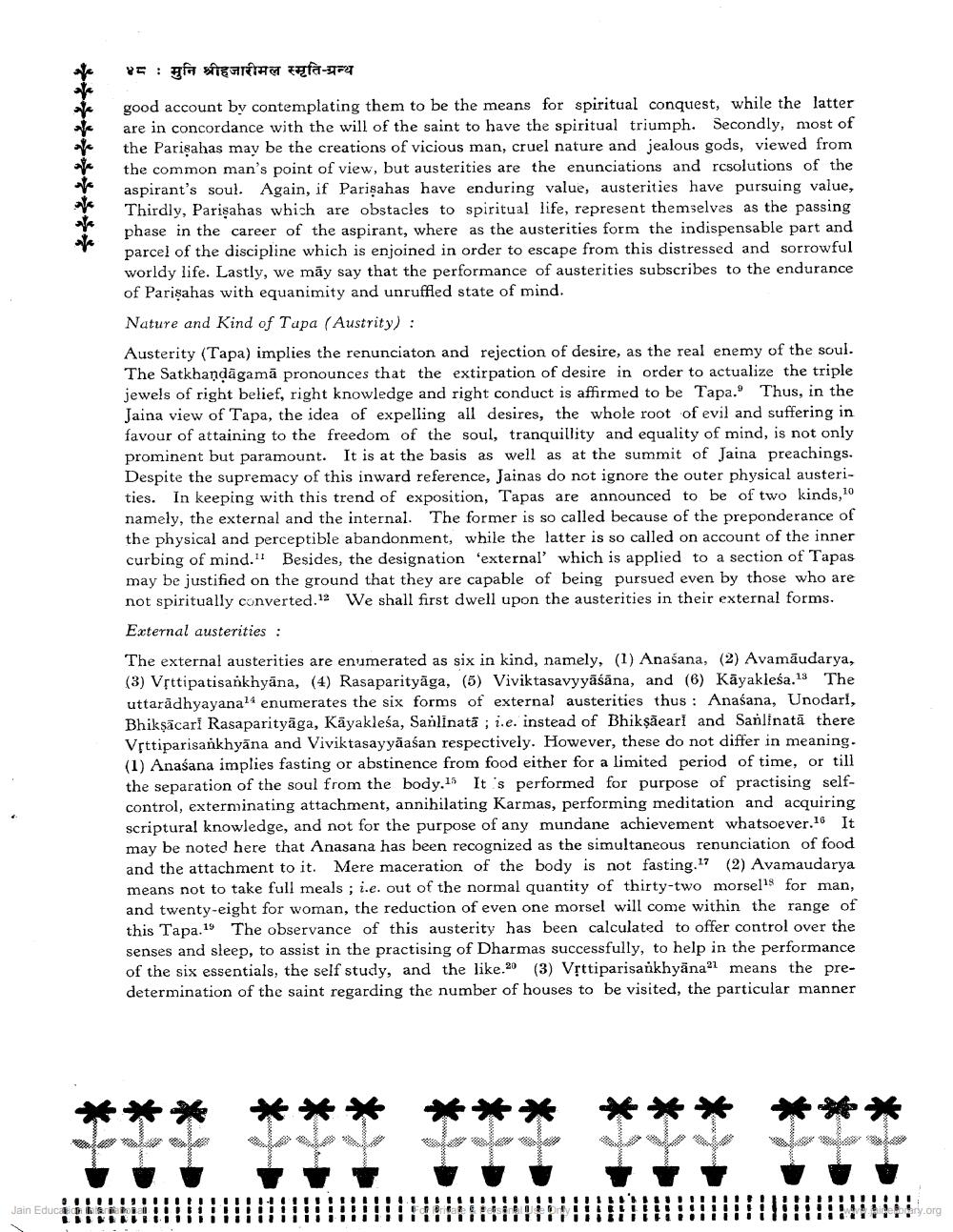Book Title: Concepts on Parisaha and Tapa in Jainism Author(s): Kamalchand Sogani Publisher: Z_Hajarimalmuni_Smruti_Granth_012040.pdf View full book textPage 4
________________ ४८ : मुनि श्रीहजारीमल स्मृति-ग्रन्थ good account by contemplating them to be the means for spiritual conquest, while the latter are in concordance with the will of the saint to have the spiritual triumph. Secondly, most of the Parişahas may be the creations of vicious man, cruel nature and jealous gods, viewed from the common man's point of view, but austerities are the enunciations and resolutions of the aspirant's soul. Again, if Parişahas have enduring value, austerities have pursuing value, Thirdly, Parisahas which are obstacles to spiritual life, represent themselves as the passing phase in the career of the aspirant, where as the austerities form the indispensable part and parcel of the discipline which is enjoined in order to escape from this distressed and sorrowful worldy life. Lastly, we māy say that the performance of austerities subscribes to the endurance of Parişahas with equanimity and unruffled state of mind. Nature and Kind of Tapa (Austrity) : Austerity (Tapa) implies the renunciaton and rejection of desire, as the real enemy of the soul. The Satkhandägamā pronounces that the extirpation of desire in order to actualize the triple jewels of right belief, right knowledge and right conduct is affirmed to be Tapa. Thus, in the Jaina view of Tapa, the idea of expelling all desires, the whole root of evil and suffering in favour of attaining to the freedom of the soul, tranquillity and equality of mind, is not only prominent but paramount. It is at the basis as well as at the summit of Jaina preachings. Despite the supremacy of this inward reference, Jainas do not ignore the outer physical austerities. In keeping with this trend of exposition, Tapas are announced to be of two kinds, 10 namely, the external and the internal. The former is so called because of the preponderance of the physical and perceptible abandonment, while the latter is so called on account of the inner curbing of mind. Besides, the designation 'external which is applied to a section of Tapas may be justified on the ground that they are capable of being pursued even by those who are not spiritually converted, 12 We shall first dwell upon the austerities in their external forms. External austerities : The external austerities are enumerated as six in kind, namely, (1) Anasana, (2) Avamāudarya, (3) Vsttipatisankhyāna, (4) Rasaparityāga, (5) Viviktasavyyāśāna, and (6) Kāyakleśa.13 The uttarădhyayanal4 enumerates the six forms of external austerities thus : Anaśana, Unodari, Bhikṣācari Rasaparityāga, Kayakleša, Sanlinata ; i.e. instead of Bhikṣāeari and Sanlinatā there Vrttiparisankhyāna and Viviktasayyāaśan respectively. However, these do not differ in meaning. (1) Anaśana implies fasting or abstinence from food either for a limited period of time, or till the separation of the soul from the body.15 Its performed for purpose of practising selfcontrol, exterminating attachment, annihilating Karmas, performing meditation and acquiring scriptural knowledge, and not for the purpose of any mundane achievement whatsoever. 16 It may be noted here that Anasana has been recognized as the simultaneous renunciation of food and the attachment to it. Mere maceration of the body is not fasting. 17 (2) Avamaudarya means not to take full meals ; i.e. out of the normal quantity of thirty-two morsels for man, and twenty-eight for woman, the reduction of even one morsel will come within the range of this Tapa.19 The observance of this austerity has been calculated to offer control over the senses and sleep, to assist in the practising of Dharmas successfully, to help in the performance of the six essentials, the self study, and the like.20 (3) Vrttiparisankhyānal means the predetermination of the saint regarding the number of houses to be visited, the particular manner * * * * * * * * IIIIIIIIII Jain Educat i i IIIIIIIiiii IIIIIIIIIIIIIII IIIIIIILO8EB: IIIIIIII IIII H ary.orgPage Navigation
1 2 3 4 5 6 7 8 9 10 11 12 13 14 15 16 17 18
